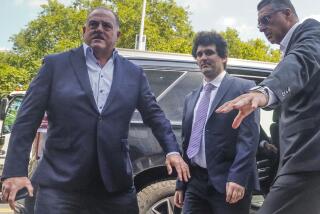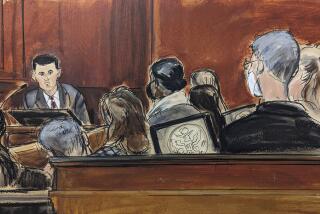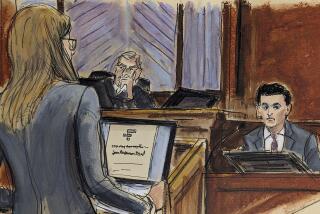Skilling Is Grilled on Accounting
- Share via
HOUSTON — The temperature at the Enron Corp. trial rose a few degrees Tuesday as the government confronted former Chief Executive Jeffrey K. Skilling on allegations that he used accounting tricks to hide losses and pump up earnings in the two years before the energy company’s 2001 slide into bankruptcy.
During the second day of Skilling’s cross-examination, Prosecutor Sean M. Berkowitz and the defendant clashed repeatedly over issues great and small -- even quibbling at one point over the distinction between the phrases “core businesses” and “core areas of focus.”
Skilling resisted being corralled into yes-or-no answers, and Berkowitz just as aggressively cut him off. At one point, U.S. District Judge Sim Lake admonished the two for speaking over each other.
Berkowitz and Skilling also sparred Tuesday over incidents in January and July 2000, when prosecution witnesses said Skilling had personally encouraged subordinates to dip into earnings reserves to add a penny or two per share of reported profit, explicitly so that Enron could meet or beat the quarterly earnings targets of Wall Street analysts.
Witnesses said these boosts sometimes came just hours before the earnings figures were announced to the public.
Berkowitz showed on the courtroom video screen a transcript of Skilling’s November 2002 testimony to the Securities and Exchange Commission in which he denied ever giving instructions that he knew would cause a change in the quarterly results.
“Wasn’t that a lie, sir?” Berkowitz asked.
“No,” Skilling replied.
Berkowitz asked Skilling about testimony that he had told former Chief Accounting Officer Richard A. Causey that he wanted Enron to post 34 cents of earnings per share for the second quarter of 2000, when the Wall Street forecast was 32 cents.
Skilling acknowledged asking Causey to “shoot for 34” but said it had nothing to do with the Wall Street forecast. Causey had told him that earnings were “coming in hot” that quarter, so Skilling suggested raising the company’s internal profit target, he testified. He denied suggesting that Causey dip into reserves, saying that would have been wrong.
Skilling, 52, and former Enron Chairman Kenneth L. Lay, 64, are charged with multiple counts of conspiracy and fraud that could land them in prison for more than 20 years. Skilling also faces insider-trading charges concerning his sales of tens of millions of dollars worth of Enron stock.
Berkowitz quizzed Skilling about the complex financial structures that Enron used to move debt off its balance sheet. Skilling testified last week that the structures -- code-named Raptors inside Enron -- were legitimate hedging devices, although he acknowledged that they were exotic.
Berkowitz pressed Skilling with documents and transcripts of testimony from previous witnesses to show that the Raptors were used as a dumping ground for troubled assets, keeping potential losses from hitting Enron’s income statement.
The Raptors’ solvency depended on Enron’s stock maintaining a high price. In 2001, as Enron shares tumbled, the Raptor structures collapsed and threw hundreds of millions of dollars in losses back onto Enron’s books -- one of the events that prosecutors say led to Enron’s Dec. 2, 2001, bankruptcy filing.
Berkowitz asked Skilling to acknowledge that subordinates felt he was pushing them into Raptors deals so that Enron could meet earnings targets.
“Go ahead, show me something, ‘cause I don’t think it’s there,” Skilling shot back.
Toward the end of Tuesday’s session, Berkowitz quizzed Skilling about problems in 2001 with Enron Broadband Services, which was trying to create a market for trading electronic communications capacity.
Enron touted the unit, which also planned to deliver video-on-demand services via the Internet, as a big part of its future growth. Thus, Berkowitz said, it was important to convince Wall Street that the broadband unit was meeting its financial targets.
By spring of 2001, however, the telecom industry was lurching into a meltdown, and it became apparent that the unit would not meet its targets.
Berkowitz put on the screen the text of a quarterly earnings report that Skilling delivered to analysts April 17, 2001. Skilling read most of the script as prepared by Enron’s investor-relations staff, but he skipped over a section disclosing that the broadband unit would miss its targets and probably post a loss of $95 million to $100 million, instead of $65 million as projected.
Berkowitz said he would attempt to complete his cross-examination today. Skilling’s chief defense lawyer, Daniel M. Petrocelli, is to follow with a re-direct examination to rebut points made by the government.
More to Read
Inside the business of entertainment
The Wide Shot brings you news, analysis and insights on everything from streaming wars to production — and what it all means for the future.
You may occasionally receive promotional content from the Los Angeles Times.










